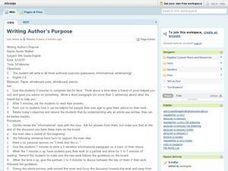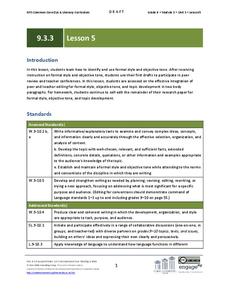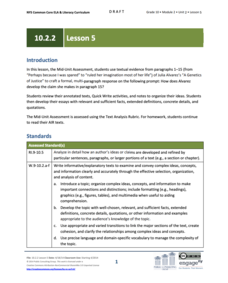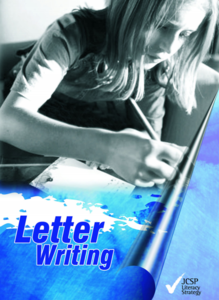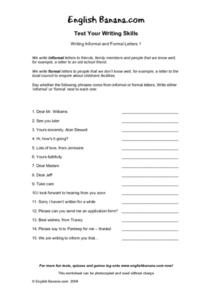Teach It Primary
What Letter Will You Write?
After reading "The Pied Piper of Hamelin," scholars discuss the emotions the events provoked in its characters. In pairs, writers compose a letter depending on the topic and style of their choice then reply to their own or a peer's...
California Education Partners
Eleven
It is difficult to articulate how growing up feels as accurately and beautifully as Sandra Cisneros does in her short story "Eleven." After seventh graders read the story and note the author's use of figurative language, they respond to...
University of North Carolina
Effective Email Communication
Despite its speed and convenience, an e-mail may not always be the best form of communication. As part of a series on specific writing assignments, a handout shares information on effective e-mail communication. In addition to outlining...
Trinity University
Explain Yourself: An Expository Writing Unit for High School
Introduce expository writing with a unit that asks writers to craft an essay to explain a belief, value, or priority that is important to them. Mini-lessons within the unit focus on crafting thesis statements and conclusions, selecting...
Curated OER
Using Words: Verbal Communication
Written and verbal communication is the topic for today. The class goes over various facets of verbal communication, such as plain English, active voice, passive voice, cliché, and jargon. They then use those devices as they discuss...
Beacon Learning Center
Beacon Lesson Plan Library: Formal or Informal?
Start talking trash with your elementary English class! Then lead a discussion comparing formal and informal language. Divide the class into groups to answer a questionnaire and analyze a set of sentence cards to analyze. This is a cool...
Curated OER
Be Your Own Chief Editor
The value of this punctuation and grammar lesson is in the SMART board presentation, which takes pupils through the proofreading process. It would be a good way to introduce the idea of proofreading in your class before beginning a unit...
West Contra Costa Unified School District
Expository Writing in Math
Pupils engage in an activity where one partner reads directions while the other follows those directions to complete a math task (such as bisecting an angle). As a reflection, they examine products to see what information the best...
Curated OER
Writing Author's Purpose
Write in all three authorial purposes (persuasive, informational, entertaining) with this lesson. Young writers consider a time when a friend of theirs helped them out and gave them advice on something. They write a short paragraph (no...
University of North Carolina
Literature (Fiction)
An informative installment of the Writing for Specific Fields series helps readers learn how to interpret and write about fiction. The website details nine easy steps for writing a literary analysis—a useful method for all readers!
Curated OER
From Formal To Slang
Tenth graders define the term slang, explaining its various social, historical, and racial contexts, so as to articulate when it can be appropriately used as a means of effective communication. They use their own personal slang lexicon,...
Virginia Department of Education
Determining Purpose and Audience
Build the writing skills of your junior high wordsmiths with activities that introduce many essential skills of writing. As a class, they develop working definitions of formal vs. informal writing, explore different categories of...
EngageNY
Drafting Body Paragraphs
That's just the style. Learners begin with a mini-lesson about formal writing style. They then use what they learned about formal writing to begin the body paragraphs for their End of Unit 1 Assessment Prompt: Adversity in the Middle...
California Education Partners
Vincent Van Gogh
Living in someone's shadow would be difficult for anyone, including one of the most talented artists of the modern age. Middle schoolers read an excerpt from Vincent Van Gogh: Portrait of an Artist by Jan Greenberg and Sandra Jordan...
Channel Islands Film
Santa Cruz Island - Writing for Information
After re-viewing a documentary segment on the restoration of Santa Cruz Island,, individuals craft an essay in which they compare the views of the various stake holders featured in the video and identify the point of view they find the...
EngageNY
Grade 9 ELA Module 3, Unit 3, Lesson 5
Class members examine examples that model how to develop and maintain a formal style and an objective tone in informative/explanatory writing. They also engage in a peer review activity and revise their work based on the feedback.
EngageNY
Grade 10 ELA Module 2: Unit 2, Lesson 5
How do learners use textual evidence from a close reading to write a well-developed essay? Scholars try it by completing a mid-unit assessment based on their analysis of the first 15 paragraphs from "A Genetics of Justice" by Julia...
Curated OER
Writing - Letters
The basic structure of a useful lesson in formal letter writing is here, but there are no procedural details or support materials to implement it. However, the idea is worth pursuing, to help your learners develop a strong understanding...
Curated OER
Letter Writing - Formal
Although rarely used these days, letter writing is still a form of writing reviewed in schools. After examining written letters, middle schoolers discuss characteristics of a formal letter and its parts. They choose a famous person to...
JCSP Programme
Letter Writing
Is letter writing becoming a lost art? In this age of Facebook, Twitter, and e-mail introduce your kids to the three P's--paper, pen, and postage. Although written from an Irish point of view, the materials in this packet model how to...
EngageNY
End of Unit Assessment: Presentation of Position
What is the difference between formal and informal language? Pupils rewrite their position speeches to adapt them for an audience of adults. Next, they present their speeches in small groups, attempting to answer the question, "Which...
Fluence Learning
Writing About Informational Text: The Dred Scott Decision
Looking for a performance assessment that asks individuals to demonstrate their competency in writing about informational text? Use Frederick Douglass' essay "On the Dred Scott Decision," and an excerpt from Abraham Lincoln's 1857 speech...
Scholastic
Writing to a Historical Poet
Poetry is a very personal and introspective art form. Give your class the opportunity to understand how a poet's voice can speak to them on a personal level, and that every reader can respond to an author differently. After a poetic...
Curated OER
Writing Informal and Formal Letters
An informal/formal letters worksheet asks pupils to label the 15 greetings, salutations, and wording of passages from sample letters as being examples of either informal or formal writing.










